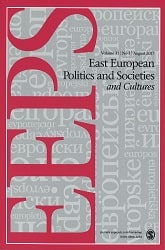The European Union, Russia, and the Future of the Transnistrian Frozen Conflict
The European Union, Russia, and the Future of the Transnistrian Frozen Conflict
Author(s): Theodor TudoroiuSubject(s): Governance, International relations/trade, Geopolitics, Peace and Conflict Studies
Published by: SAGE Publications Ltd
Keywords: Transnistria/Transdniestria; frozen conflict; Moldova; Russia; European Union;
Summary/Abstract: In recent years, increased European Union interest in its eastern “neighborhood” has been hailed as a possible solution of the Transnistrian frozen conflict. The fall of the communist authoritarian regime of Chişinău and the internal crisis of the Smirnov regime in Tiraspol also modified the conditions of the nineteen-year conflict. However, the European involvement in Moldova is perceived by the Kremlin as an intrusion in its own domaine réservé. Moreover, the 2008 war in South Ossetia illustrates Russia’s return to the early 1990s policy of overt instrumentalization of the post-Soviet frozen conflicts. This volatile situation is analyzed in order to predict the future evolution of the Transnistrian conflict in the larger context of the developing regional rivalry between Brussels and Moscow.
Journal: East European Politics and Societies
- Issue Year: 26/2012
- Issue No: 01
- Page Range: 135-161
- Page Count: 27
- Language: English
- Content File-PDF

